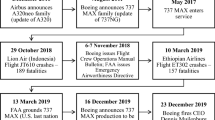Abstract
In 2016, the Behavior Analyst Certification Board (BACB) made effective a new, revised ethical code for behavior analysts, the Professional and Ethical Compliance Code for Behavior Analysts, replacing the code that had been in effect since 2001. In this revised code, the certification board has shifted the language of the code from that of a set of guidelines to that of a set of enforceable rules. This important shift has not been well discussed in the field. This article explores the potential implications and possible consequences of such a shift and describes other ways that ethical behavior has been approached historically. The authors then propose an ethical decision-making process that might provide a better area of focus for the field of behavior analysis in seeking to develop the highest levels of ethical behavior in its professionals and provide a case example using that process to resolve an ethical dilemma.

Similar content being viewed by others
Notes
An excellent online resource for a nonspecialist’s introduction to ethics is The Stanford Encyclopedia of Philosophy (https://plato.stanford.edu/).
References
Abramson, M. (1996). Reflections on knowing oneself ethically: toward a working framework for social work practice. Families in Society: the Journal of Contemporary Social Services, 77(4), 195–202.
Aristotle (1999). Nicomachean ethics (2nd ed., T. Irwin, Trans.). Indianapolis, IN: Hackett.
Association of Professional Behavior Analysts. (2017). Overview of state laws to license or otherwise regulate practitioners of applied behavior analysis. Retrieved from www.apbahome.net
Autism Speaks. (2017). State priorities. Retrieved from https://www.autismspeaks.org/state-initiatives
Bailey, J., & Burch, M. (2016). Ethics for behavior analysts (3rd ed.). New York, NY: Routledge.
Behavior Analyst Certification Board. (2001). Guidelines for responsible conduct for behavior analysts. Littleton, CO: author.
Behavior Analyst Certification Board. (2014a). Professional and ethical compliance code for behavior analysts. Littleton, CO: author.
Behavior Analyst Certification Board. (2014b, September). Special edition on ethics [special issue]. BACB Newsletter. Retrieved from https://www.bacb.com/wp-content/uploads/2017/09/BACB_Newsletter_09-14.pdf
Brodhead, M. T. (2015). Maintaining professional relationships in an interdisciplinary setting: strategies for navigating nonbehavioral treatment recommendations for individuals with autism. Behavior Analysis in Practice, 8(1), 70–78.
Deochand, N., & Fuqua, R. W. (2016). BACB certification trends: State of the states (1999 to 2014). Behavior Analysis in Practice, 9(3), 243–252.
Dittrich, L. (2016). Patient H. M.: a story of memory, madness, and family secrets. New York, NY: Random House.
Donvan, J. J., & Zucker, C. B. (2017). In a different key: the story of autism. New York, NY: Crown.
Dougher, M. J. (2017). President’s column. Inside Behavior Analysis, 9(2), 2–4.
Fisher, C. B. (2016). Decoding the ethics code: a practical guide for psychologists (4th ed.). Los Angeles, CA: Sage.
Fong, E. H., & Tanaka, S. (2013). Multicultural alliance of behavior analysis standards for cultural competence in behavior analysis. International Journal of Behavioral Consultation and Therapy, 8(2), 17–19.
Fong, E. H., Catagnus, R. M., Brodhead, M. T., Quigley, S., & Field, S. (2016). Developing the cultural awareness skills of behavior analysts. Behavior Analysis in Practice, 9(1), 84–94.
Goldiamond, I. (1974). Toward a constructional approach to social problems: ethical and constitutional issues raised by applied behavior analysis. Behaviorism, 2(1), 1–84.
Kangas, B. D., & Vaidya, M. (2007). Trends in presentations at the annual conference of the Association for Behavior Analysis. The Behavior Analyst, 30(2), 117–131.
Kant, I. (1959). Foundations of the metaphysics of morals. Indianapolis, IN: Bobbs-Merrill (Originally published 1785).
Kidder, R. M. (2005). Moral courage. New York, NY: HarperCollins.
Kidder, R. M. (2009). How good people make tough choices: resolving the dilemmas of ethical living (rev. ed.). New York, NY: Harper.
Kix, P. (2008, June 17). The shocking truth. Boston Magazine. Retrieved from http://www.bostonmagazine.com/2008/06/the-shocking-truth/
LeBlanc, L. A., Heinicke, M. R., & Baker, J. C. (2012). Expanding the consumer base for behavior-analytic services: meeting the needs of consumers in the 21st century. Behavior Analysis in Practice, 5(1), 4–14.
Lovaas, O. I. (1987). Behavioral treatment and normal educational and intellectual functioning in young autistic children. Journal of Consulting and Clinical Psychology, 55(1), 3–9.
McAllister, J. W. (1972). Report of resident abuse investigating committee. Tallahassee, FL: division of Retardation, Department of Health and Rehabilitative Services.
Mill, J. S. (1957). Utilitarianism. New York, NY: Bobbs-Merrill (Originally published 1861).
O’Leary, P. N., Miller, M. M., Olive, M. L., & Kelly, A. N. (2017). Blurred lines: ethical implications of social media for behavior analysts. Behavior Analysis in Practice, 10(1), 45–51.
Schreck, K. A., & Miller, V. A. (2010). How to behave ethically in a world of fads. Behavioral Interventions, 25(4), 307–324.
Sellers, T. P., Alai-Rosales, S., & MacDonald, R. P. F. (2016). Taking full responsibility: the ethics of supervision in behavior analytic practice. Behavior Analysis in Practice, 9(4), 299–308.
Shafer-Landau, R. (Ed.). (2013). Ethical theory: an anthology (2nd ed.). Chichester, UK: Wiley-Blackwell.
Tanaka-Matsumi, J., Seiden, D. Y., & Lam, K. N. (1996). The culturally informed functional assessment (CIFA) interview: a strategy for cross-cultural behavioral practice. Cognitive and Behavioral Practice, 3(2), 215–233.
Turner, L. B., Fischer, A. J., & Luiselli, J. K. (2016). Towards a competency-based, ethical, and socially valid approach to the supervision of applied behavior analytic trainees. Behavior Analysis in Practice, 9(4), 287–298.
Wong, C., Odom, S. L., Hume, K. A., Cox, A. W., Fettig, A., Kucharczyk, S., et al. (2015). Evidence-based practices for children, youth, and young adults with autism spectrum disorder: a comprehensive review. Journal of Autism and Developmental Disorders, 45(7), 1951–1966.
Zheng, P., Gray, M. J., Zhu, W.-Z., & Jiang, G. R. (2014). Influence of culture on ethical decision making in psychology. Ethics & Behavior, 24(6), 510–522.
Author information
Authors and Affiliations
Corresponding author
Ethics declarations
Conflict of Interest
Nancy Rosenberg declares she has no conflict of interest. Ilene Schwartz declares she has no conflict of interest.
Rights and permissions
About this article
Cite this article
Rosenberg, N.E., Schwartz, I.S. Guidance or Compliance: What Makes an Ethical Behavior Analyst?. Behav Analysis Practice 12, 473–482 (2019). https://doi.org/10.1007/s40617-018-00287-5
Published:
Issue Date:
DOI: https://doi.org/10.1007/s40617-018-00287-5




